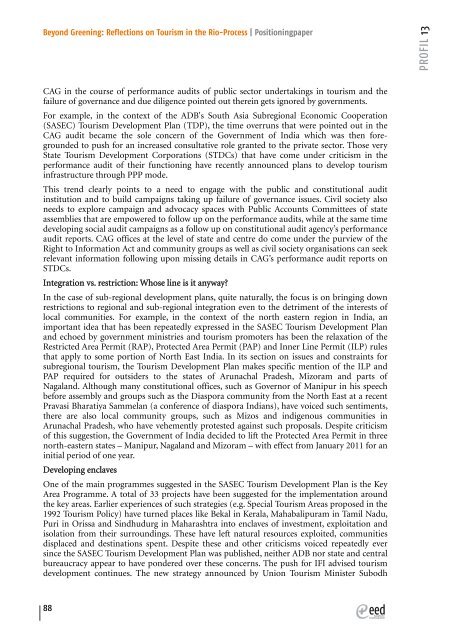Beyond Greening - Tourism Watch
Beyond Greening - Tourism Watch
Beyond Greening - Tourism Watch
Create successful ePaper yourself
Turn your PDF publications into a flip-book with our unique Google optimized e-Paper software.
<strong>Beyond</strong> <strong>Greening</strong>: Reflections on <strong>Tourism</strong> in the Rio-Process | PositioningpaperCAG in the course of performance audits of public sector undertakings in tourism and thefailure of governance and due diligence pointed out therein gets ignored by governments.For example, in the context of the ADB's South Asia Subregional Economic Cooperation(SASEC) <strong>Tourism</strong> Development Plan (TDP), the time overruns that were pointed out in theCAG audit became the sole concern of the Government of India which was then foregroundedto push for an increased consultative role granted to the private sector. Those veryState <strong>Tourism</strong> Development Corporations (STDCs) that have come under criticism in theperformance audit of their functioning have recently announced plans to develop tourisminfrastructure through PPP mode.This trend clearly points to a need to engage with the public and constitutional auditinstitution and to build campaigns taking up failure of governance issues. Civil society alsoneeds to explore campaign and advocacy spaces with Public Accounts Committees of stateassemblies that are empowered to follow up on the performance audits, while at the same timedeveloping social audit campaigns as a follow up on constitutional audit agency’s performanceaudit reports. CAG offices at the level of state and centre do come under the purview of theRight to Information Act and community groups as well as civil society organisations can seekrelevant information following upon missing details in CAG’s performance audit reports onSTDCs.Integration vs. restriction: Whose line is it anyway?In the case of sub-regional development plans, quite naturally, the focus is on bringing downrestrictions to regional and sub-regional integration even to the detriment of the interests oflocal communities. For example, in the context of the north eastern region in India, animportant idea that has been repeatedly expressed in the SASEC <strong>Tourism</strong> Development Planand echoed by government ministries and tourism promoters has been the relaxation of theRestricted Area Permit (RAP), Protected Area Permit (PAP) and Inner Line Permit (ILP) rulesthat apply to some portion of North East India. In its section on issues and constraints forsubregional tourism, the <strong>Tourism</strong> Development Plan makes specific mention of the ILP andPAP required for outsiders to the states of Arunachal Pradesh, Mizoram and parts ofNagaland. Although many constitutional offices, such as Governor of Manipur in his speechbefore assembly and groups such as the Diaspora community from the North East at a recentPravasi Bharatiya Sammelan (a conference of diaspora Indians), have voiced such sentiments,there are also local community groups, such as Mizos and indigenous communities inArunachal Pradesh, who have vehemently protested against such proposals. Despite criticismof this suggestion, the Government of India decided to lift the Protected Area Permit in threenorth-eastern states – Manipur, Nagaland and Mizoram – with effect from January 2011 for aninitial period of one year.Developing enclavesOne of the main programmes suggested in the SASEC <strong>Tourism</strong> Development Plan is the KeyArea Programme. A total of 33 projects have been suggested for the implementation aroundthe key areas. Earlier experiences of such strategies (e.g. Special <strong>Tourism</strong> Areas proposed in the1992 <strong>Tourism</strong> Policy) have turned places like Bekal in Kerala, Mahabalipuram in Tamil Nadu,Puri in Orissa and Sindhudurg in Maharashtra into enclaves of investment, exploitation andisolation from their surroundings. These have left natural resources exploited, communitiesdisplaced and destinations spent. Despite these and other criticisms voiced repeatedly eversince the SASEC <strong>Tourism</strong> Development Plan was published, neither ADB nor state and centralbureaucracy appear to have pondered over these concerns. The push for IFI advised tourismdevelopment continues. The new strategy announced by Union <strong>Tourism</strong> Minister Subodh88












